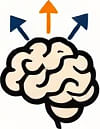Overcoming Mental Barriers for a High-Agency Mindset
 by Marlene Keeling
by Marlene Keeling
Discover practical strategies and drills to break through mental barriers and build a high-agency mindset. This guide offers actionable steps for ambitious professionals seeking personal growth, empowering you to take control and achieve your goals with confidence.

Developing a high-agency mindset begins with recognizing the internal obstacles that often hold us back. Mental barriers can appear as self-doubt or limiting beliefs, making it hard to move forward. To address this, start by examining your daily thoughts and patterns.
One effective drill involves daily reflection exercises. Set aside ten minutes each morning to write down three barriers you anticipate facing that day, such as fear of failure. This practice helps build awareness and sets the stage for action. For instance, if procrastination frequently disrupts your progress, use a timer to work in focused bursts, gradually increasing the duration to strengthen your resolve.
Moving to specific strategies, consider cognitive reframing as a core technique. This means challenging negative assumptions and replacing them with positive, realistic alternatives. A simple drill: when a barrier arises, pause and ask yourself what evidence supports your doubt. By doing so, you train your mind to respond proactively rather than reactively.
In practice, visualization drills can make a big difference. Spend five minutes imagining yourself succeeding despite obstacles. This mental exercise fosters resilience and prepares you for real-world challenges. For professionals aiming for career advancement, combining visualization with goal-setting creates a powerful routine. Write down one achievable goal weekly and break it into smaller steps, ensuring each action builds your sense of control.
Another key area is building habits that promote resilience. Physical activity serves as an excellent drill here. Engage in regular walks or workouts, as they release endorphins and clear mental clutter. Track your consistency over a month to see improvements in your overall mindset. For those in demanding roles, integrating mindfulness breaks—such as deep breathing during work hours—can reduce stress and enhance focus.
Let’s explore decision-making drills to further empower your approach. Create a decision journal where you record choices made each day and their outcomes. Over time, this helps identify patterns in your behavior and encourages bolder decisions. If hesitation often stops you, practice by making small, low-stakes choices quickly, like trying a new route to work. This builds confidence for larger decisions.
To solidify these strategies, incorporate accountability measures. Pair up with a peer or mentor for regular check-ins, discussing progress and setbacks openly. This external support reinforces your commitment without overwhelming you. Additionally, use progress tracking tools, such as a simple notebook, to log wins and lessons learned, turning abstract efforts into tangible results.
For ambitious individuals, applying these drills in everyday scenarios is crucial. Suppose you’re preparing for a job interview; use role-playing exercises to simulate potential questions and responses. This preparation diminishes anxiety and sharpens your ability to perform under pressure. Remember, consistency is key—repeat these drills weekly to embed them into your routine.
Now, consider emotional regulation as part of your toolkit. When barriers feel overwhelming, employ grounding techniques like focusing on your senses to stay present. A practical drill: in moments of stress, name five things you can see and four you can touch, redirecting your energy productively. This method supports long-term personal development by preventing minor issues from escalating.
Finally, celebrate milestones along the way. Acknowledge each breakthrough, no matter how small, to maintain motivation. By consistently applying these strategies and drills, you’ll cultivate a high-agency mindset that drives success and fulfillment.
Common Drills for Building Agency
- Daily reflection: Write barriers and counter-strategies.
- Visualization sessions: Imagine overcoming challenges.
- Decision journaling: Track and analyze choices.
- Physical routines: Incorporate exercise for mental clarity.
- Accountability partnerships: Share progress regularly.
Through persistent effort, these approaches transform mental barriers into opportunities for growth, empowering you to lead a more purposeful life.
